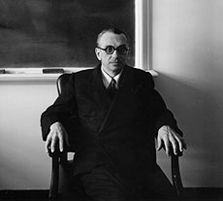
he
Gödel Centenary Research Prize Fellowship is the follow-up program to
the Templeton Foundation’s commemoration in 2006 of the centenary of
Kurt Gödel, who was considered by many in his field to have been the
greatest logician since Aristotle. As part of those

celebrations, the
Foundation sponsored an international symposium of 20 leading scholars
at the University of Vienna which was opened by the President of Austria,
as well as a gala dinner addressed by world chess champion, Garry Kasparov.

To create a more lasting tribute, the Foundation has initiated a $1.4
million grant for the establishment of a research fellowship prize program
to encourage original research in logic that will further illuminate
our understanding of the field. The awards comprise two pre-doctoral
fellowships of $60,000 per annum for two years; two post-doctoral fellowships
of $80,000 per annum, also for two years; and one senior fellowship of
$120,000 for one year.

“We had around 60 applications in all categories,” reports Matthias Baaz,
general secretary of the Kurt Gödel Society, which administered the awards.
“One should, of course, explain that there is an estimated number of
250, maybe 300, logicians in the world.” He suspects the numbers might
have been even higher, but that some younger applicants may have been
deterred by the very rigorous format of the awards process.

Applicants were required to compete by publishing relevant research papers
in a special issue of the journal
Annals of Pure
and Applied Logic. “This
is one of the two most important journals in the field of logic,” says
Baaz. Yet, even if some young logicians were intimidated by the process,
others rose to the challenge: “The consequence of this competition was
that, contrary to what was expected, the scientists in these young categories
(pre- and post-doctoral) were very strong.”

An international Board of Jurors, chaired by Professor Harvey Friedman
of Ohio State University, adjudicated the awards. “I definitely feel
there were some outstanding awards given,” says Friedman, “and some outstanding
finalists that didn’t make the winners’ list.” Fellowship proposals from
all fields of logic were eligible, as well as proposals from philosophy,
theology, and other fields of science, provided the research and the
proposed project were based on the methods and achievements of contemporary
logic so strongly shaped by Gödel’s way of mathematical reasoning.

This program will run until 2010. Baaz believes that the legacy of Gödel
was crucial to his discipline. “Before Gödel, logic was in a certain
sense very chaotic and in a mathematical sense not developed. After Gödel,
it was completely different.” He forecasts that logic, which is perhaps
undervalued today, will come into its own in the near future, as humanity
strives to confront the consequences of ever-increasing automation, asserting
the primacy of the human mind and reasoning.

These predictions relate primarily to the mathematical aspect of logic.
On the philosophical side, does he think logic has a relationship to
spirituality? “It has, for sure. Logic is something that orders the mind,”
he says. “Without logic and human reason, you cannot speak of spirituality.”



 he
Gödel Centenary Research Prize Fellowship is the follow-up program to
the Templeton Foundation’s commemoration in 2006 of the centenary of
Kurt Gödel, who was considered by many in his field to have been the
greatest logician since Aristotle. As part of those
he
Gödel Centenary Research Prize Fellowship is the follow-up program to
the Templeton Foundation’s commemoration in 2006 of the centenary of
Kurt Gödel, who was considered by many in his field to have been the
greatest logician since Aristotle. As part of those  celebrations, the
Foundation sponsored an international symposium of 20 leading scholars
at the University of Vienna which was opened by the President of Austria,
as well as a gala dinner addressed by world chess champion, Garry Kasparov.
celebrations, the
Foundation sponsored an international symposium of 20 leading scholars
at the University of Vienna which was opened by the President of Austria,
as well as a gala dinner addressed by world chess champion, Garry Kasparov.